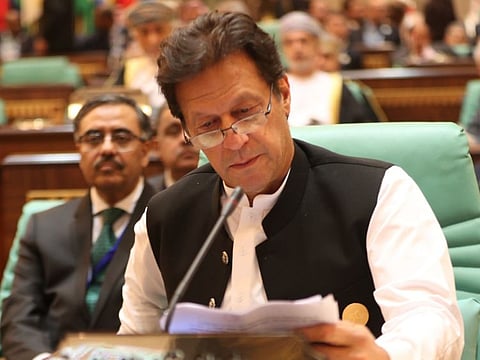Austerity budget will help fix Pakistan economy
People have to share the burden with prompt payment of taxes

An array of taxes spanning almost all sectors has been the feature of Pakistan’s highest-ever budget of Rs6 trillion (Dh147.32 billion).
The first budget of Imran Khan’s government, presented by Minister of State for Revenue Hammad Azhar on Tuesday, was in line with the demands of the International Monetary Fund (IMF), which provided a $6 billion (Dh22 billion) bailout package.
Yet the government will face an uphill task to bridge the deficit of Rs3.56 trillion, which is more than half of the total budget.
The proposals will set off a massive price hike and inflation, which will hit the people hard in the coming months. Government efforts to fix the economy will be painful for the people in the form of taxes and the proposed tax revenue target is Rs5.55 trillion ($36.75 billion).
The increases in electricity and gas tariffs are to meet IMF conditions for the loan. Income tax rates go up from 25 to 35 per cent.
To expand the tax base, the government has revised the minimum limit for taxable income to Rs50,000 per month for salaried people and Rs33,333 for non-salaried persons.
Although tax hikes are a prominent part of the budget, net pensions were raised by 10 per cent, and there is a similar increase in the salaries of government employees from grades 1-16. Moreover, minimum wages have been increased.
Increased taxes won’t go down well with the people. Imran Khan realised that, which is why he addressed the nation hours after the budget presentation in a bid to pacify people.Gulf News
The "austerity-focused budget" is not merely aimed at the public but also at ministers and advisers, whose salaries have been trimmed by 10 per cent.
The move to keep military spending unchanged at Rs1.15 trillion is understandable, given the tense neighbourhood. One of the gripes has been that there are no sops for overseas Pakistanis who form the backbone of the economy with remittances of more than $2 billion this year.
The challenge for the government will be tax collection. Pakistan has struggled for decades to collect taxes with estimates suggesting that only around one per cent of the 200-million population filed returns in 2018.
In such a scenario, increased taxes won’t go down well with the people. Imran Khan realised that, which is why he addressed the nation hours after the budget presentation in a bid to pacify people.
The prime minister said half of the Rs4 trillion that Pakistan collects goes for debt servicing. So boosting tax revenue to cut the reliance on borrowings is essential to mend public finances.
Prompt payment of taxes will go a long way in putting Pakistan economy on the road to recovery.



